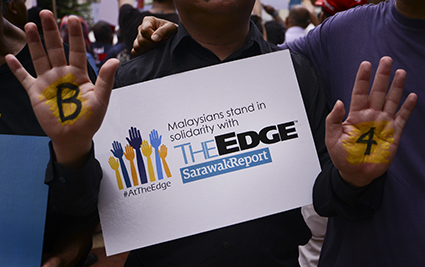
Kai Ping Lew
REGION (Pacific Scoop/ Pacific Media Watch): Global media freedom groups and protesters have been putting pressure on Malaysian authorities over a crackdown on The Edge Financial Daily and The Edge Weekly newspapers, which have recently been suspended for three months after reporting on how the government investment fund 1 Malaysia Development Berhad (1MDB) was used to funnel $US700 million into Prime Minister Najib Razak’s bank account.
Access to whistleblower website Sarawak Report, which also reported on the issue, was blocked in Malaysia. An arrest warrant was issued for the Report’s London-based editor Clare Rewcastle Brown.
The Southeast Asian Press Alliance (SEAPA) has called the government’s actions serious transgressions of press freedom and the right to information. It said that reports about fraud and embezzlement were in the public interest and essential to the duty of the news media society.
Reporters Without Borders (RSF) also condemned the actions of the Malaysian government, calling for the interior ministry to drop the charges against Clare Rewcastle Brown, rescind the suspension of The Edge publications, and to stop blocking the Sarawak Report website.
“It is completely unacceptable for the government to harass journalists because of their investigative coverage of matters involving the Prime Minister,” said RSF head of the Asia-Pacific desk Benjamin Ismaïl.
‘A pretend democracy’
“Key democratic institutions such as freedom of speech, freedom of expression, and free media don’t exist in Malaysia,” said Sarawak Report editor Clare Rewcastle Brown.
“Najib likes to pretend he runs a country that is a democracy where these freedoms exist. What I have done is go ahead and expose that they don’t and how this has resulted in massive abuses of power,” she said.
Rewcastle Brown said that the government had responded by clamping down even further on freedom of speech, referring to the tightening of the Sedition Law, Deputy Minister Zahid Hamidi’s threat to retaliate toughly against media if they “spun” information, and the amendment of laws to regulate online content.
“I don’t think other countries can get away with pretending Malaysia is a moderate Muslim democracy anymore. The country has enjoyed the benefits of being a democracy while the citizens have been exploited and not given the freedoms others assumed it had,” said Rewcastle Brown.
“Someone once said the only thing worse than a dictatorship is a pretend democracy. And that’s what Malaysia has turned into.”
Local media support
In response to government’s actions, the Coalition of Press Freedom (CPF) organised a rally on August 8 which saw 400 members of the media and the wider public showing their support for both The Edge and Sarawak Report.
“The media is supposed to be part and parcel of the parliamentary democracy. We’re looked to as the public voice,” said CPF spokesperson Hazlan Zakaria.
Although they did not expect their rally to affect the change the government’s position, he emphasised the importance of getting public support.
“We need to stand on their backs. We can’t do our duties without them. The public might need us, but we need the public more,” he said.
He noted that social media was instrumental in the organisation of the rally, which spread their details using the hashtag #attheedge.
“Social media is the greatest enabler of our time, especially in a media environment where most traditional media are run by the cronies or proxies of political parties.”
Hazlan said their next campaign would be to move against the government proposal for all online portals to be registered.
The Coalition of Press Freedom is a loose alliance of media groups comprising of the Centre for Independent Journalism (CIJ), Reporters Without Borders (RSF), Angry Media Movement (GERAMM), and Foreign Correspondents Club of Malaysia.
Regional solidarity
SEAPA executive director Edgardo Legaspi said another way to hold the government accountable is through a strong civil society.
“We saw this in Malaysia in the past, with the Bersih (Malay word for clean) rallies for free and fair elections. We are waiting to see what they will do for the upcoming Bersih 4.0 rally on August 29 and 30.”
The Bersih 4.0 rally will demand for free and fair elections, a transparent government, the right to demonstrate, strengthening the parliamentary democracy system, as well as saving the national economy.
“Journalists are looking at the rally and finding ways to link their struggle with the mainstream activities of the civil society.”
Legaspi said regional solidarity was a challenge for SEAPA – to get journalist groups fighting for press freedom to support Malaysians in their struggle.
“There needs to be more discussion, especially on the ASEAN level,” he said, referring to the Association of Southeast Asian Nations, of which Malaysia is a member.
“Currently, the ASEAN wants the media to cover their activities but at the same time they don’t understand that the media has a serious struggle of their own,” said Legaspi.
Asia New Zealand Foundation media adviser Rebecca Palmer said the organisation greatly valued the freedom of the media and encouraged New Zealand journalists to support their counterpart in media freedom issues.
“It is important for New Zealand journalists to gain a better understanding of the Asian region and to build networks with their counterparts in Asia.”
The organisation, which sponsors journalism exchanges in Asian countries such as Thailand and Indonesia, aims to build New Zealanders’ knowledge and understanding of Asia.
This work is licensed under a Creative Commons Attribution-NonCommercial 3.0 New Zealand Licence.




